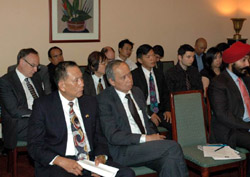June 17, 2010
Promoting Human Rights in Vietnam:
A Workshop at the Canadian Parliament
Statement by Dr. Chan Tran, Viet Tan
Honorable Members of Parliament,
Ladies and gentlemen,
Thank you for participating in today’s workshop at the Canadian Parliament on human rights in Vietnam. We especially appreciate the Honorable Navdeep Bains and your staff, Attorney Chris McLeod and your law firm Cambridge LLP for all your help and support.
To understand the human rights challenges in Vietnam, I would like to share two incidents.
The first incident relates to renowned Vietnamese novelist and democracy activist Tran Khai Thanh Thuy.
In October 2009, the Vietnamese government brought numerous citizens to trial for so-called propaganda against the socialist state. Thuy attempted to attend a trial in the coastal city of Hai Phong but was forcibly turned back by police. That evening, the police orchestrated a raid on her home by gangsters. Thuy and her husband were beaten and suffered serious physical injuries. But in an ironic twist that can only occur in a dictatorship, the couple was charged with physical assault.
In the following days, state media published a picture of a bloodied man that the 5-foot-tall Thuy supposedly assaulted. Vietnamese bloggers analyzed the picture and discovered that it was a fake. The photo was actually taken in 2005 and then photoshopped to appear to have happened at the time of the incident. Thuy was subsequently sentenced to three and a half years in jail on the phony charge. Her husband received two years of house arrest.
Clearly, Thuy was punished for her peaceful opposition to government policies. She had blogged extensively about corruption and social injustice. What happened to Thuy could have happened to any Vietnamese citizen living under such an arbitrary legal system. If the regime wants to silence you, they can and will find any means to do so.
Unfortunately, Thuy’s fate could also be experienced by Westerners doing business in Vietnam. You may have a genuine commercial dispute, but the authorities will turn it into a criminal offense. Indeed, there have been repeated cases of foreign businesspeople detained in Vietnam or had their passports seized because of investment deals gone bad.
Tran Khai Thanh Thuy is just one of many political prisoners in Vietnam. Her story symbolizes the repression and arbitrary legal system in the country.

The second incident I would like to share with you pertains to bauxite. This mineral ore as you may know is an input for producing aluminum. There are large bauxite deposits in Vietnam’s Central Highlands, a region rich in ethnic cultures and biodiversity. The Vietnamese authorities hatched a plan to extract the bauxite through open-pit mining, and then process it into alumina through a highly toxic method; and finally transport the alumina hundreds of kilometers to the sea for export to China.
Early last year, a civic movement was organized against the Hanoi government’s bauxite plans. Respected academics organized a petition warning of the potential ecological disaster. The government considers bauxite mining a major developmental policy but has done very little to prepare for the environmental impact. Within months, thousands of Vietnamese had signed the petition. The environmental movement also created a website called Bauxite Vietnam. By December of last year, this website had gone viral, receiving nearly 20 million hits.
So what did the Hanoi regime do? It organized a sophisticated cyberattack against the website, eventually crashing it through massive denial of service attacks according to an investigation by Google and security company McAfee. This was part of a larger, systematic effort beginning last December to hack websites and blogs featuring news and opinions critical of the government.
Recently, security police subjected organizers of the anti-bauxite petition and website to so-called working sessions. There is something very wrong when Vietnamese citizens are prevented from freely discussing their country’s development policies. Who then truly benefits from these policies? The human rights abuses present an economic challenge as well as a sustainable development challenge.
Let me conclude my remarks by offering three suggestions on promoting human rights in Vietnam:

First, join us in calling for the release of imprisoned democracy activists such as Tran Khai Thanh Thuy. Your voice, your letter to the Vietnamese authorities, makes a difference. In a few days Vietnamese Prime Minister Nguyen Tan Dung will be in Toronto for the G20 summit. This is a particularly important occasion to speak out against the recent wave of arrests in Vietnam.
Second, call on the Canadian embassy in Hanoi to request access to democracy activists on trial or in prison. The visit of a Canadian diplomat serves as an important source of moral support for the detained activist and his or her family. It will also let the Hanoi regime know that the world is watching.
Third, advocate for development policies that make environmental sense and invite input from all parts of Vietnamese society. At a meeting of international donors in Vietnam last summer, ambassadors drew attention to the risks of bauxite mining. We applaud this and hope that there will be a sustained effort to question ill-conceived development policies by the Vietnamese government, especially when Canadian taxpayers are generously supporting some of these policies.
Novelist Tran Khai Thanh Thuy and the Bauxite Vietnam movement exemplify a growing civic movement in Vietnam for democracy and social justice—despite the repression. Ultimately it will be the Vietnamese people who achieve their freedom. International friends, however, can help play an important role in defending human rights and supporting democratic voices in Vietnam.
Thank you for your support.





